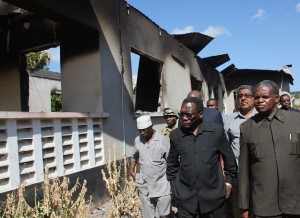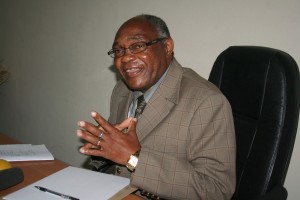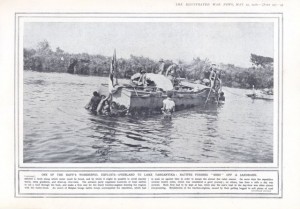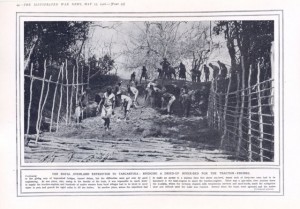by David Brewin
Historical background
Tanganyika at independence in 1961 had its own government and three years later Zanzibar at its independence also had its own. It was a time of great local and international tension. Tanganyika had had an army mutiny and Zanzibar had had a violent revolution. The East-West cold war was in full swing and both sides were worried about what might happen in Zanzibar, as its frequently unpredictable new President Abeid Karume had invited the Soviet satellite East Germany (not recognised as a state by most of the West) to send experts and establish a presence in the Isles. America and the Western countries were alarmed at the potentially destabilising effect in East Africa of a communist state like Cuba (which still makes trouble for the US all these years later) on the doorstep of East Africa. Both sides were impressed however by the new leader of Tanganyika Julius Nyerere and relied upon him to come up with a solution.
Few know precisely what happened during the Tanganyika – Zanzibar negotiations which were conducted personally by the two presidents, but the result was a new Constitution (two, in fact, because Zanzibar had its own) which were ingenious and innovative and have stood the test of time, in spite of years of friction between the two sides. It created a new nation with two governments called the United Republic of Tanzania. The Union government had wide powers in both countries, and the Zanzibar government, which was not granted sovereign status, had certain powers in Zanzibar. There were two presidents, two governments and two parliaments (not three, which many thought would be more logical). Nyerere, a man of great sagacity, realised that the new Union was a delicate flower likely to die unless there was a strong central government and the Zanzibaris were given influence and power far beyond what their respective populations (now 45 million and 1.5 million) would justify.
Many people on both sides have complained over the years about this unusual set up. But Nyerere insisted over and over again that the Union must remain constitutionally as it was. He said that if three governments were set up this would lead to the end of the Union. All subsequent presidents and parliaments have followed the same line.
The new draft constitution
Following many expressions of opposition to a continuation of the status quo, as explained in recent editions of TA, the Constitutional Review Commission (CRC), under its Chairman Judge Joseph Warioba, travelled all over the country to ask people what they wanted in the new constitution. Finally, on 3 June 2013, they surprised many by publishing a very detailed draft, called the “Mother Plan,” which would totally change many aspects of the existing constitution.
The most contentious issue was the future structure of government. The Commission rejected the present two-part government because of “the sensitivities and opposition from both sides of the Union.” It proposed instead a federal union with three governments – a Tanzanian government, a new government described as Bara Tanzania (Mainland Tanzania) and a Zanzibar government.
Some other surprises
The draft constitution provides other detailed proposals which have already stimulated debate, a debate which will continue until the final document is agreed. Examples:
– the Government of the United Republic of Tanzania, which was created in April 1964, would be substantially reduced in size with about 15 cabinet ministers and a parliament of about 75 members (20 from Zanzibar). There would be five members from the mainland appointed by the President and allocated to the disabled; the provision of special seats for women would not be continued;
-the number of Union matters would be drastically reduced from the current 22 to seven: foreign affairs, immigration, citizenship, defence and security, the central bank, currency, registration of political parties and constitutional issues;
-there would be proportional representation with the details worked out later;
-cabinet ministers and the Speaker of the National Assembly would be selected from outside parliament;
-details of any gifts made to public officials would have to be submitted to the Chief Secretary for approval and public officials would be barred from holding more than one office in government;
-the rights of minority groups such as hunter gatherers (the Hadzabe and Akiye ethnic groups comprising less than 2,000 people) would be recognised and they would be given representation in governance structures where appropriate.
Omissions
Some concern has been expressed about the omission of many key matters from the draft document. These include land ownership, protection of property rights, health, education, exploitation of natural resources, dual citizenship, participation by people in the affairs of the state, freedom of the press, religious differences, and the right to information. It is understood however that provision might be made for some of these in the new Mainland and Zanzibar constitutions.
There is also the problem that, although Zanzibar has its own constitution which will merely require amendment, a new constitution will have to be drafted for Tanzania Bara, then debated, passed and inaugurated, which could be a lengthy process.
Needless to say, discussions are going on around the country and the draft might be substantially changed, but space constraints prevent TA from reporting on most of the comments made so far.
However, the magnitude of the task facing the government in finalising the constitution(s) is illustrated by two statements made at recent public meetings. The former East African Community (EAC) Secretary General, Ambassador Juma Mwapachu, described the move to have an “autonomous Zanzibar” as a drawback to the East African regional integration process. He said that Vice President of Zanzibar Seif Sharriff Hamad’s statement to the effect that Zanzibaris should regain their citizenship and have full autonomy on international issues amounted to a breaking of the Union. “With such comments I wonder what East African people are going to think or say about the nature of the proposed East African citizenship,” he added.




